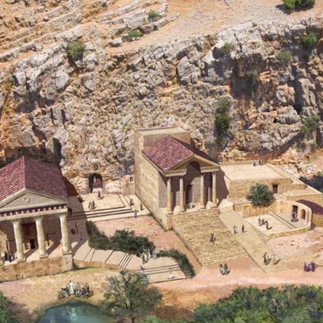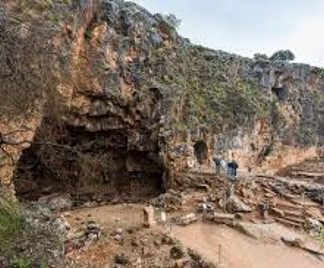When Jesus came into the district of Caesarea Philippi, he asked his disciples, “Who do people say that the Son of Man is?” And they said, “Some say John the Baptist, but others Elijah, and still others Jeremiah or one of the prophets.” He said to them, “But who do you say that I am?” Simon Peter answered, “You are the Messiah, the Son of the living God.” And Jesus answered him, “Blessed are you, Simon son of Jonah! For flesh and blood has not revealed this to you, but my Father in heaven. And I tell you, you are Peter, and on this rock I will build my church, and the gates of Hades will not prevail against it. I will give you the keys of the kingdom of heaven, and whatever you bind on earth will be bound in heaven, and whatever you loose on earth will be loosed in heaven.” Then he sternly ordered the disciples not to tell anyone that he was the Messiah.
Matthew 16:13-20
Location: Buying a House
Megan and I have been married for six years, and in those six years, we have moved six times. Moves from seminary to rentals to owning a home. We finally decided to buy a house in Nashville during the pandemic; I mean who wouldn’t with those interest rates? Remember when they were in the 2s and 3s?
And when Russ called, as he did every three months for three years straight, I told him, “We just bought a house. There is no way we’re moving.” We lived on an acre of land, tucked in some hills, a few miles from downtown. We had one foot in the country and one in the city. It was an ideal situation.
But even with that said, he invited us down to Houston, and well, after visiting here and talking with so many staff and parishioners, we sold that house after living in it for only eight months. God was so clearly calling us, but it meant yet another move.
We were in a small apartment off Bering just a mile away, until we moved into our house just days before Hannah, our daughter, was born.
After that many moves, Megan and I know a thing or two about the real estate business. One of the primary things your agent will repeat to you when you are looking at a potential house is location, location, location.
The bones of the house may be good, the kitchen may be spacious, and the closets voluminous, but where is that house located? What school district is it in? What does the HOA cover? And…did it flood in Harvey?
The value of a house, in some major way, is linked to the larger neighborhood and surrounding area.
Location: Caesarea Philippi
And when looking at our reading from Matthew 16 today, if we are to really understand its significance, then there’s one thing that cannot be forgotten: location, location, location.
The whole focus of this passage is the interaction between Peter and Jesus, but we’d be missing a huge clue in the text if we only looked at what Jesus asked his disciples without seeing where he did it.
So, a little context. Matthew tells us that Jesus brought his disciples to the region of Caesarea Philippi, a major city some 25 miles north of the Sea of Galilee (where Jesus did a majority of his ministry).
It would have been a two-day journey to get to this northernmost border of Israel. Its location demarcated Israel from the rest of the Gentile world, though the city itself was heavily influenced by the Greco-Romanism.
The city was originally given to Herod the Great by Caesar Augustus, and Herod’s son, Phillip, went about rebuilding the city (the Herod family loved doing construction projects).
Once this grand project was complete, Phillip changed the name of the city from Panion to, essentially, Caesar-City-of-Phillip as a way to honor both Caesar and himself. Another unsurprising move from the self-indulgent Herods.
For years, Caesarea Philippi had been the center of worship for the Syrian god Baal and then the Greek god Pan (hence the old name of the city). Even though it was under the control of the nominally Jewish Herods, the typical citizen was either Syrian or Greek.
And so, the religious life of the city was the exact opposite of what you’d find in Jerusalem. There were temples for multiple gods, even one built at the mouth of a cave for the god Pan, and sometimes they’d throw children down into the cave as a sacrifice.
Archaeologists have even found coins from that time minted with the depiction of a temple built to honor Caesar Augustus, a god in his own right. And today, you can still see some cultic shrines and niches there when you visit.
So, just the name Caesarea Philippi gives us a clue to the Herod family’s attempt to butter up their Roman overlords yet again; and the wild scenes around the temples made it evident that good, Galilean Jews didn’t come around these parts very often.
You can almost hear the disciples whispering under their breath, “We’re not in Capernaum anymore.”
And so, why would Jesus bring his disciples to such a place as this? A city that so loved the empire and the gods they brought with them. Or what I like to call, a Torah-less territory.
It seems that Jesus had them walk north for two days just to ask them a question. By walking through the streets of Caesarea Philippi they technically had one foot in Israel, and another foot in the world. For Jesus, it was time to have “the talk” that every relationship must have when things get serious.
This is the “let’s define the relationship” moment, OR a literal “come to Jesus” moment.
“Y’all have heard some rumors,” Jesus says, “so who do people say I am?” And they come up with a not-too-surprising list of past and current prophets, one even being his now-deceased cousin.
And then he looks around at them, with these symbols of the other world religions and foreign powers behind his shoulder, and he says, “Okay, but what about you? Amid the noise of all these rumors, what do you have to say about me?”
And unbeknownst to Peter, what comes out of his mouth is a gift that has come directly from God the Father. Nothing up to this point would’ve given any of the disciples a sense of certainty about Jesus’ identity. Maybe they were beginning to wonder a bit, but not with the emphatic confidence of Peter’s proclamation.
He doesn’t say, “I think you are the Christ,” or “For us, you are the Christ.” No, he says, “Jesus you are the Messiah, the King that Israel has long waited for, and David’s royal heir. You are the Answer sent straight from God himself.”
Karl Barth says that Peter’s confession is the Alpha and Omega of all biblical testimony. Flesh and blood did not reveal this to him; it was a gift from Jesus’ Father in heaven. And even though he is not naturally fitted to be an apostle (or the rock) it is by the grace of God that Jesus makes him what he is” (CD I.2.21 p. 673).
What just came out of Peter’s mouth was a miracle.
In a similar vein, the Early Church Father, John Chrysostom makes the interesting point that when Peter called Jesus “the Son of God,” Jesus then reciprocated by calling Peter, “the son of Jonah,” as a way of hinting that as Peter was the very substance of his father Jonah, so Jesus, no less truly, was the very substance of his Father, the Living God. (Bruner 126). Brilliant.
Now as Protestants, we make the distinction from our Catholic brothers and sisters that when Jesus blesses Peter, giving the keys to the kingdom and such, he is actually blessing Peter’s confession.
Any disciple who receives Jesus into their heart and professes with their mouth that Jesus is Lord, they too, are blessed. Peter is the first, and what a great example he gives us, but this gift of being a rock on which the church is built is a gift given to each disciple.
One of my favorite writers, Dale Bruner, likes to say that every disciple who points to Jesus is mortar for the church. This Christ-centered pointing to the Savior of the world continues to build the church up (127-28).
But we have to be willing to point like Peter. Bruner goes on to say, “The Christian church is well when she is as decisive and emphatic as Peter [You are the Messiah!]; [but] she is sick when she equivocates [uncertain of her beliefs, much] like the notorious politician, who told his audience, ‘Those are my convictions; if you don’t like them, I have others’” (121).
“Who do you say that I am?” What a marvelously simple and yet challenging question from Jesus to all those who dare follow him.
And that gets us to the crux of the matter today.
This makes me think of my childhood priest who passed away last month. He was known for asking one particular question to parishioners (and even potential employees). He loved to ask folks: “Who is Jesus Christ to you?”
He once asked a seminarian who was hoping to join his staff that simple question and the only thing the seminarian could say was, “If I knew you were going to ask me that, I would’ve prepared for it.” As if his whole life—and especially his seminary training—didn’t force him to consider that question before!
And so, who is Jesus Christ to you?
Amid all the noise that surrounds us; all the voices and talking heads that demand our time, attention, and loyalty: who is Jesus Christ to you? What does it look like to faithfully follow him with your family, your friends, and all those you come in contact with?
Confessing Christians are the stones and mortar that continue to build God’s church to this very day. From this place, we go to our different neighborhoods, our schools, and offices, and we have the chance to be like Pointing Peter and direct people to Jesus.
Some of the places we go may be receptive, while others would be more at home in a place like Caesarea Philippi. But Jesus didn’t shy away from that city; he went there so that Peter’s confession could be made with one foot in Israel and one foot in the world—one in the holy and the other in the mundane, profane, hustle and bustle of the city.
It’s where our profession meets our confession. Where our families see the fruition of a gospel-centered life. Where our neighbors behold the values of God’s kingdom through our words and deeds. Ultimately, it is where faith is taken out of the church and into the streets of our daily lives.
Location, location, location.
With all that said, ironically, the location that Jesus really cares about, the real estate he wants more than anything else, the must-have place that he will pay (and has paid) it all to have, is our heart.
It may be the hardest place for him to get to, and the costliest one in the world, but once he’s found a home there, well then, he’ll never move out. And from the depths of our own hearts, we can say, “You are the Messiah, the Son of the Living God.”
13th Sunday after Pentecost. Proper 16. Year A. Matthew 16:13-20. Bruner’s Matthew Vol. 2.
_JPG.jpg)












コメント